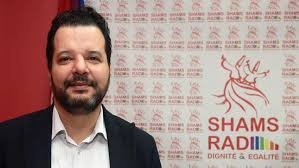Tara Abhasakun, joined by Dan Fisher, interviews Mounir Baatour, Tunisia’s first openly gay presidential candidate.
Transcript below.
Tara Abhasakun: Why are you running for president?
Mounir Baatour: Because I’m fighting for the individual freedom and LGBT rights since many years now. Homosexuality is still criminalized in Tunisia, homosexuals are still jailed for three years. I think I’m the best person who can change this, and can remove Article 230 of the criminal code in Tunisia.
Tara Abhasakun: So for everyone here who is not Tunisian, Article 230 is a law in Tunisia that if you have homosexual sex you are jailed for three years, is that right Mounir?
Mounir Baatour: Yes.
Tara Abhasakun: Have you received a lot of support?
Mounir Baatour: Yes I’ve received a lot of support, I have more than 10,000 signatures from the electorate to support my candidacy, and all members of the party support me.
Tara Abhasakun: What are the demographics of your supporters?
Mounir Baatour: The majority of them are young and educated.
Tara Abhasakun: For everyone here [watching], Mounir and I spoke to each other three years ago when I was writing an article about homosexuality in Tunisia. I believe you told me, Mounir, that this [homophobia] comes from a very conservative reading of Islam, is that correct Mounir?
Mounir Baatour: Yes, it’s correct.
Tara Abhasakun: In the three years since we have spoken, do you believe that the dialog and conversation around LGBT rights has evolved at all?
Mounir Baatour: There is a debate in society and the media about homosexuality since four or five years, but I think there is no progress in the case, no change. The states continues to arrest homosexuals and put them in jail, continues to use anal examinations as an evidence of homosexuality. For me it’s torture. For world-wide organizations, gotta stop them from using anal examinations. There is no positive thing after this discussion and debate. For that, I am the candidate to turn to other candidates to ask them to take positions on Article 230, and turn to the people for them to approve to put homosexuals in prison.
Tara Abhasakun: So you talked about the state’s response where a lot of the time police will still do these horrible anal examinations, I think mainly on gay men, to test if people are gay, like if people were having gay sex. Which of course is absurd.
Mounir Baatour: And the doctors use these examinations to give evidence to the judge against homosexuals, and if he’s practiced sodomy or not.
Tara Abhasakun: What about within people’s families? The last time we spoke, there was a gay man who had attempted suicide because his family could not accept his sexuality. In Tunisian families today, is it still like this? Do parents still not accept their children if they’re gay or lesbian?
Mounir Baatour: There is no acceptance by family. The most important persecution against homosexuals comes from family. And the family usually put their children out of the home when they discover that they’re homosexual.
Tara Abhasakun: So most of the persecution comes from people’s own families, correct?
Mounir Baatour: Yes. Homosexuals have three enemies in Tunisia: family, police, and state.
Dan Fisher: Do families turn their own children over to the police? Is that a common occurance?
Mounir Baatour: A lot of families denounce their children to the police.
Tara Abhasakun: I know that you’ve been involved in fighting against homophobia in Tunisian society for a very long time. You’re the leader of an organization called SHAMS Tunisia, Can you tell the audience a bit about your organization and what you’ve been doing?
Mounir Baatour: Shams was created in 2015, and the most important work of SHAMS is to create debate in the media, in the parliament, and the institutions, the civil society about homosexuality. We try to get homosexuals out of jail, and we are paying lawyer to defend homosexuals. We have shuttles for homosexuals who are put out by their family. We try to talk about problems faced by homosexuals in society, and try to explain what is homosexuality, to speak to explain that it’s not a choice, not a sickness, not perversity, it’s a natural thing.
Tara Abhasakun: Yeah, I think that’s so important, I mean even in the United States, I’m sure you know, we still have people who think it’s a choice for some reason, it’s absurd. Can your tell us a bit about the success of SHAMS, or some of the victories you’ve had?
Mounir: Our last victory is against government. They tried to shut down SHAMS by justice [the justice system], and we won the case on May 20.
Tara Abhasakun: Oh wow that’s great! So have there been many cases like this where people have tried to shut down SHAMS?
Mounir: Mostly the government. And the group of Muslim Imams, but we won all of the cases.
Tara Abhasakun: That’s very important. Obviously we know the role of religion is often very important in spreading homophobia, clerics are often a very big part of spreading homophobia. Do you believe that in Tunisian society, clerics have a lot of influence?
Mounir Baatour: Homophobia is very high in Tunisian society. We need a lot of work in civilized society about what homosexuality is, and all the persecution against homosexuals and LGBT community, to give them evidence that homosexuals are victims in this society and to explain that homophobia can’t keep.
Tara Abhasakun: And do you think a big part of this comes from Imams? In Tunisian society, do you think people take the Imams very seriously?
Mounir Baatour: I don’t think that. The homophobia comes not from Imams, but comes from tradition, from vision of a woman, from misogyny, from masculine mentality. And for them a homosexual is like a woman, it’s not like a man, and for them it’s a bad image of men when we are homosexual. It’s a mentality.
Tara Abhasakun: I think that’s a very important point too, the connection between misogyny and homophobia. You yourself are a gay man. Do you experience homophobia in everyday life?
Mounir Baatour: No, not against me.
Tara Abhasakun: What can the international community do?
Mounir Baatour; The international community have to speak out for homosexuals in Tunisia, have to publish articles in media, have to collect witness about persecution, and turn to the Tunisian government to stop this genocide.
Tara Abhasakun: Thank you so much for being with us today.
Dan Fisher: It’s been a huge privilege, thank you.
Mounir Baatour: Thank you.




